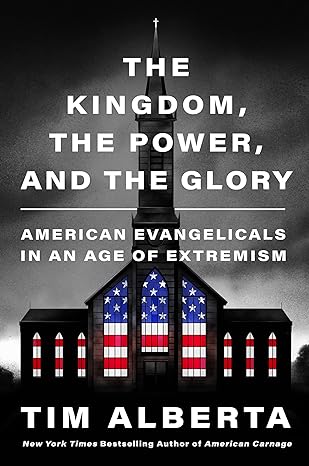Deep Look At American Evangelicalism Falls Just Short In Being All That It Could Have Been. Up front: I too am a former Southern Baptist Convention evangelical. My own sojourn of the last 20+ yrs has taken me from a child raised by a Deacon under the pastorage of a man through my teens who would later become a President of the Georgia Baptist Convention to a wanderer searching for a truly Christian (as the First Church would have truly understood it) community. As politics fails the Church - as Alberta documents well here - I have become ever more solid in my belief that the Church should have absolutely nothing at all to do with politics - which Alberta is less solid on here.
Structured in the wake of Alberta's father's death - a prominent megachurch pastor in Michigan - and some rather nasty political comments some Alberta had known for many years made to him in those darkest of moments, this book travels the United States - and even goes briefly abroad - examining the ways American Evangelicals have allowed the lure of politics to sway them, how some are fighting back, and what others are doing in response. It is a darkly hopeful tale of somehow, someway, potentially maybe clawing back to some semblance of historical Christianity that the American Church has long lost, and the overall narrative here is actually rather solid.
With a *few* holes. One is the complete lack of any documentation whatsoever in the ARC copy I read. Indeed, the ARC copy was so incomplete as to not even have the epilogue to the tale - which alone was an error that I nearly "will not reviewed" the book over, but I was able to obtain an Audible copy instead to at least be able to complete this review. However, the lack of documentation in the ARC was a single star deduction, as I normally expect to see around 20-30% documentation in nonfiction books in my vast experience reading nonfiction ARCs over the years. The other star deduction is the book's intense focus on Jerry Falwell Sr and his progeny - both biologically (Jerry Falwell Jr and his siblings) and ideologically (Liberty University), a focus that nearly derails the book in taking up such a seemingly large chunk of it.
The final hole, which didn't rise to the level of necessitating a star deduction but *did* rise to the level of necessitating commentary within the review, were the several times Albert used common mythologies - such as guns being the "leading cause of death of children" - without supporting documentation. (Indeed, when one checks the CDC's own data, guns are not the leading cause of death for *any* single age grouping of legal children. It is only when legal adults aged 18-19 are included - legal adults who *can and do serve in the US military* - when guns become a leading cause of death according to CDC data.) The presence of such known and easily disproven myths detracts from the reliability of the overall narrative, which is a shame, since for the most part Alberta's reporting seems to be pretty damn solid, at least from my own part of the world.
Overall, this is a truly strong and truly sobering look at the state of American Evangelicalism circa the late 2010s/ early 2020s, and a clarion call for needed change within the American Church overall. Will anything actually change? Alberta seems hopeful. I too am *hopeful*... if slightly more pessimistic on the actual realities. Filled with case study after case study after case study and interview after interview after interview, Alberta truly does a mostly strong job making his case, with the caveats noted above.
Finally, to be clear, the Audible version (and presumably the fully released text version) does include the epilogue and *hopefully* the also-missing bibliography.
Very much recommended.
